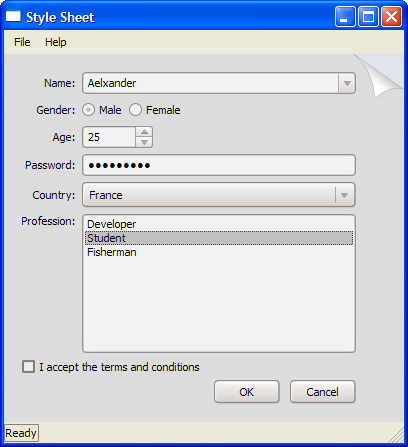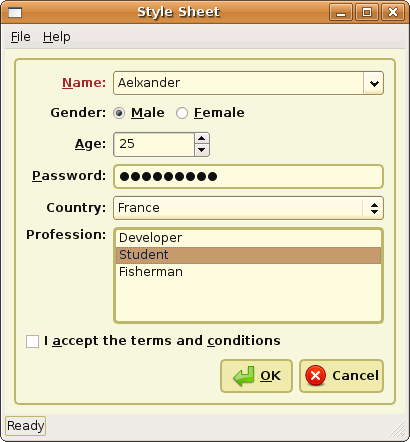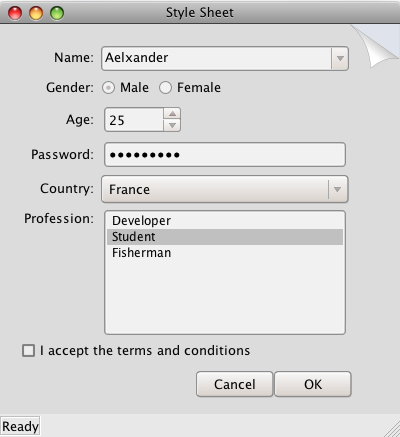- Accueil Actualités IT Pro
- Conception Cycle de vie du logiciel
- Java Plateforme et langage Java
- .NET Microsoft Framework .NET
- Dév. Web Développement Web et Webmarketing
- EDI Environnements de Développement Intégré
- Langages Langages de programmation applicatifs
- SGBD Systèmes de Gestion de Bases de Données
- Office Bureautique pour l'entreprise
- Solutions d'entreprise Autres logiciels pour l'entreprise
- Applications Applications logicielles
- Systèmes Logiciels et matériels systèmes
Qt Style SheetsQt Style Sheets are a powerful mechanism that allows you to customize the appearance of widgets, in addition to what is already possible by subclassing QStyle. The concepts, terminology, and syntax of Qt Style Sheets are heavily inspired by HTML Cascading Style Sheets (CSS) but adapted to the world of widgets. Topics:
OverviewStyles sheets are textual specifications that can be set on the whole application using QApplication::setStyleSheet() or on a specific widget (and its children) using QWidget::setStyleSheet(). If several style sheets are set at different levels, Qt derives the effective style sheet from all of those that are set. This is called cascading. For example, the following style sheet specifies that all QLineEdits should use yellow as their background color, and all QCheckBoxes should use red as the text color: QLineEdit { background: yellow }
QCheckBox { color: red }
For this kind of customization, style sheets are much more powerful than QPalette. For example, it might be tempting to set the QPalette::Button role to red for a QPushButton to obtain a red push button. However, this wasn't guaranteed to work for all styles, because style authors are restricted by the different platforms' guidelines and (on Windows XP and Mac OS X) by the native theme engine. Style sheets let you perform all kinds of customizations that are difficult or impossible to perform using QPalette alone. If you want yellow backgrounds for mandatory fields, red text for potentially destructive push buttons, or fancy check boxes, style sheets are the answer. Style sheets are applied on top of the current widget style, meaning that your applications will look as native as possible, but any style sheet constraints will be taken into consideration. Unlike palette fiddling, style sheets offer guarantees: If you set the background color of a QPushButton to be red, you can be assured that the button will have a red background in all styles, on all platforms. In addition, Qt Designer provides style sheet integration, making it easy to view the effects of a style sheet in different widget styles. In addition, style sheets can be used to provide a distinctive look and feel for your application, without having to subclass QStyle. For example, you can specify arbitrary images for radio buttons and check boxes to make them stand out. Using this technique, you can also achieve minor customizations that would normally require subclassing several style classes, such as specifying a style hint. The Style Sheet example depicted below defines two distinctive style sheets that you can try out and modify at will.
When a style sheet is active, the QStyle returned by QWidget::style() is a wrapper "style sheet" style, not the platform-specific style. The wrapper style ensures that any active style sheet is respected and otherwise forwards the drawing operations to the underlying, platform-specific style (e.g., QWindowsXPStyle on Windows XP). Since Qt 4.5, Qt style sheets fully supports Mac OS X. Warning: Qt style sheets are currently not supported for custom QStyle subclasses. We plan to address this in some future release. [Previous: Styles] [Next: The Style Sheet Syntax] © 2008-2011 Nokia Corporation and/or its subsidiaries. Nokia, Qt and their respective logos are trademarks of Nokia Corporation in Finland and/or other countries worldwide. All other trademarks are property of their respective owners. Privacy Policy Licensees holding valid Qt Commercial licenses may use this document in accordance with the Qt Commercial License Agreement provided with the Software or, alternatively, in accordance with the terms contained in a written agreement between you and Nokia. Alternatively, this document may be used under the terms of the GNU Free Documentation License version 1.3 as published by the Free Software Foundation. |























